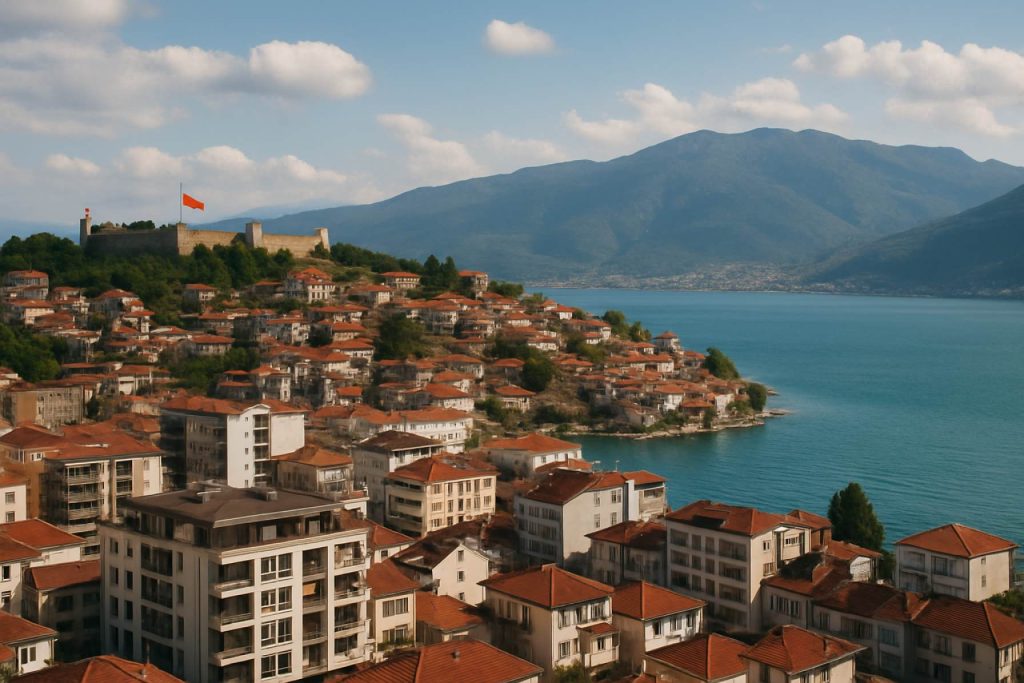
Table of Contents
- Executive Summary: Macedonia’s Real Estate Landscape in 2025
- Market Overview: Key Statistics & Recent Developments
- Economic & Demographic Drivers Shaping Demand
- Regional Hotspots: Where to Watch for Growth
- Legal Framework & Property Laws: 2025 Updates
- Taxation, Fees, and Compliance: What Buyers & Investors Must Know
- Residential vs. Commercial: Sector Performance & Outlook
- Foreign Investment Rules & Opportunities
- Risks, Challenges, and Regulatory Changes
- Future Outlook: Expert Projections for 2025–2030
- Sources & References
Executive Summary: Macedonia's Real Estate Landscape in 2025
Macedonia’s real estate sector in 2025 reflects a dynamic landscape shaped by ongoing legal reforms, steady demand, and cautious investor optimism. The market has demonstrated resilience, with property transactions experiencing moderate growth despite wider regional economic uncertainties. Driven by both domestic demand and increased interest from foreign investors—particularly in residential and commercial properties—the sector remains a significant contributor to the national economy.
The legal framework governing real estate is primarily regulated by the Ministry of Justice of the Republic of North Macedonia and is shaped by the Law on Property and Other Real Rights, as well as the Law on Construction. Recent legislative initiatives have focused on streamlining property registration processes through the digitalization of land registries and the simplification of procedures for obtaining construction permits. These reforms, overseen by the Agency for Real Estate Cadastre, have improved transparency and reduced processing times, encouraging lawful transactions and supporting compliance with EU standards.
Regarding compliance, property purchases by foreigners remain subject to reciprocity requirements, and all transactions must adhere to anti-money laundering (AML) regulations enforced by the Financial Intelligence Office. Enforcement of zoning and urban planning regulations is managed by local municipalities under the oversight of the Ministry of Environment and Physical Planning. These authorities continue to strengthen monitoring mechanisms, aiming to curb illegal construction and ensure environmentally sustainable development.
Statistically, data from the State Statistical Office of the Republic of North Macedonia show that in 2024, the number of issued building permits rose by 8% compared to the previous year, while the average price index of dwellings in Skopje—the capital and primary real estate hub—increased by approximately 6%. The volume of foreign direct investment in real estate has also risen steadily, supported by government incentives for industrial and technology park developments.
Looking ahead to 2025 and beyond, the outlook for Macedonia’s real estate sector is cautiously positive. Continued alignment with EU regulatory frameworks, digital transformation of property records, and infrastructure investments are expected to enhance market stability and attract further investment. However, challenges remain, including addressing informal construction and ensuring affordable housing supply. Policymakers and industry stakeholders are expected to prioritize transparency, compliance, and modernization to sustain growth and foster investor confidence in the coming years.
Market Overview: Key Statistics & Recent Developments
The real estate sector in the Republic of North Macedonia has shown considerable resilience and gradual growth as of 2025, amidst both regional uncertainties and internal economic reforms. According to the State Statistical Office of the Republic of North Macedonia, the volume of real estate transactions, including residential, commercial, and land sales, increased by approximately 7% in 2024 compared to the previous year. This growth is primarily driven by rising demand in Skopje and other major urban centers, where urbanization and infrastructure projects are ongoing.
The average price per square meter for newly built apartments in Skopje reached 1,350 EUR at the end of 2024, reflecting a year-on-year increase of 5%. In regional hubs such as Bitola and Ohrid, prices have also edged upward, albeit at a slower pace, with averages ranging between 900 and 1,100 EUR per square meter. The rental market has similarly strengthened, responding to both domestic migration and expatriate interest, and vacancy rates for modern office and retail spaces remain under 7% nationwide.
Legislative developments continue to shape the market landscape. Amendments to the Law on Real Estate Cadastre, enacted in late 2023, have streamlined property registration processes, reducing average registration time to under 10 working days according to the Agency for Real Estate Cadastre. Furthermore, the Ministry of Transport and Communications has announced plans to digitize further aspects of land management and permitting, aiming to increase transparency and expedite project approvals in 2025 and beyond (Ministry of Transport and Communications).
Foreign direct investment (FDI) in real estate remains robust, with the Agency for Foreign Investments and Export Promotion of the Republic of North Macedonia reporting that real estate and construction comprised over 16% of total FDI inflows in 2024. The government continues to incentivize investment through tax relief and urban development initiatives, particularly within industrial and technological zones.
Looking forward to 2025 and the next few years, the outlook is cautiously optimistic. Ongoing infrastructure upgrades, legal reforms, and a stable macroeconomic environment provide a foundation for continued growth. However, challenges persist, including the need for further digitalization of property records and greater alignment with EU regulatory standards, as outlined by the Secretariat for European Affairs. Market participants are advised to monitor evolving compliance requirements, especially concerning anti-money laundering regulations and cross-border transactions.
Economic & Demographic Drivers Shaping Demand
Macedonia’s real estate sector in 2025 is influenced by evolving economic and demographic dynamics, with broad implications for demand across residential, commercial, and industrial segments. The country’s GDP is projected to grow modestly in the coming years, supported by stable macroeconomic policies and increased foreign direct investment, particularly in construction and infrastructure. According to the National Bank of the Republic of North Macedonia, inflation is expected to remain within the central bank’s target range, supporting moderate lending activities and household spending—key drivers of real estate transactions.
Demographically, Macedonia faces the dual challenge of a gradually declining and aging population, tempered by internal migration trends and the return of diaspora investors. The State Statistical Office reports that, while the total population slightly decreased over the past decade, urban centers such as Skopje, Bitola, and Tetovo continue to attract residents seeking employment and education opportunities. This urbanization trend sustains demand for new housing, especially multi-family and mixed-use developments, as well as increased needs for retail and office space in metropolitan areas.
Affordability remains a concern, particularly among young households. Government initiatives—such as subsidized housing loans and programs facilitating first-time homeownership—are expected to continue through 2025, aiming to stimulate demand among this demographic segment. The Ministry of Finance has signaled ongoing support for such measures as part of broader efforts to enhance social stability and economic resilience.
On the commercial side, demand for logistics and industrial space is rising, reflecting Macedonia’s strategic position as a regional transit hub and the expansion of free economic zones. As noted by the Agency for Foreign Investments and Export Promotion, new investments in manufacturing and export industries are expected to boost requirements for warehousing and light industrial real estate, particularly along key transport corridors.
Looking forward, the interplay of moderate economic growth, targeted government interventions, and ongoing demographic shifts is likely to keep real estate demand stable in urban areas, with continued pressures on affordability and a gradual broadening of the investor base to include both domestic and returning diaspora buyers. These factors, together with infrastructure improvements and EU accession prospects, will shape Macedonia’s real estate landscape through 2025 and beyond.
Regional Hotspots: Where to Watch for Growth
In 2025, the real estate landscape in Macedonia is characterized by dynamic regional hotspots, driven by legislative reforms, infrastructure development, and increased cross-border investment. Key urban centers such as Skopje, Ohrid, and Bitola continue to attract the majority of real estate capital, but emerging municipalities and suburban areas are gaining visibility, especially with new government incentives and infrastructure projects.
Recent amendments to the Law on Real Estate Cadastre and the Law on Construction have streamlined property registration and building permit processes, aiming to enhance legal certainty and transparency in transactions. The introduction of digitalized land registries by the Agency for Real Estate Cadastre has reduced processing times and improved access to property data for both domestic and foreign investors. Meanwhile, the latest compliance requirements outlined by the Ministry of Finance reinforce anti-money laundering controls and reporting obligations, aligning Macedonia’s property market with EU standards.
Statistically, the number of real estate transactions in 2024 showed a year-on-year increase of 7.2%, according to the State Statistical Office. Residential property prices in Skopje’s central municipalities have surged by 9% over the past year, reflecting strong demand, while lakeside areas such as Ohrid have seen average price increases of 6%, driven by both tourism and second-home purchases. Industrial and logistics properties along the pan-European Corridor VIII are also experiencing heightened activity, as the government prioritizes infrastructural upgrades and connectivity.
For 2025 and beyond, growth is forecasted to be strongest in:
- Skopje Metropolitan Area: Continued urbanization, infrastructure expansion (notably the new ring road and public transport projects), and rising office demand.
- Ohrid & Southwestern Lakeside: Expansion of tourism infrastructure and new regulations supporting sustainable development are expected to bolster hospitality and residential sectors.
- Eastern Macedonia: Emerging logistics hubs and industrial parks, incentivized by government tax breaks and proximity to cross-border trade routes.
Investors and developers are advised to closely monitor updates from the Ministry of Economy and local municipalities for forthcoming zoning changes and investment incentives. Compliance with evolving legal frameworks, particularly regarding foreign ownership and environmental standards, remains critical for sustainable growth in Macedonia’s real estate sector through 2025 and into the coming years.
Legal Framework & Property Laws: 2025 Updates
The legal framework governing real estate in the Republic of North Macedonia continues to evolve in response to domestic economic development, regional integration efforts, and alignment with European Union (EU) standards. As of 2025, the primary legislative act remains the Law on Ownership and Other Real Rights (“Закон за сопственост и други стварни права”), as last amended in 2024. This foundational law regulates property acquisition, registration, transaction modalities, and the establishment of real rights for both domestic and foreign persons.
Significant amendments in 2024 introduced streamlined processes for property registration, aiming to further reduce administrative burdens and transaction times. The Agency for Real Estate Cadastre (AREC) has enhanced digital services for e-submission and tracking of property records. By early 2025, the average registration period for property transfers decreased to under 3 working days, reflecting the country’s ongoing drive for greater efficiency and transparency.
Foreign ownership remains a key area of compliance. Under current law, EU citizens and legal entities incorporated in EU Member States may acquire real estate under conditions equal to Macedonian nationals, except for agricultural land, which remains restricted. Non-EU foreigners must generally obtain government approval for property purchases, with exceptions specified in bilateral agreements. The Ministry of Justice continues to update guidelines to comply with EU accession negotiations, and further liberalization is anticipated if membership progresses.
Anti-money laundering (AML) and compliance obligations have tightened in 2025, in line with recommendations from the Financial Action Task Force and national legislation. Real estate agents and notaries are required to conduct enhanced due diligence for high-value transactions, with reporting requirements coordinated through the Financial Intelligence Office. Non-compliance can result in substantial fines and transaction invalidation.
In 2024, the total number of registered property transactions surpassed 80,000, driven by steady demand in urban centers such as Skopje, Bitola, and Ohrid. Residential prices continued to rise moderately, while commercial property remains attractive for foreign investors. The World Bank’s 2025 Doing Business indicators rank North Macedonia among the top regional performers for property registration efficiency (Agency for Real Estate Cadastre).
Looking ahead, further harmonization with EU law, continued digitalization, and enhanced compliance standards are expected to shape the Macedonian real estate landscape through 2027. Market participants should monitor legislative updates and ensure rigorous adherence to evolving compliance requirements to mitigate legal and transactional risks.
Taxation, Fees, and Compliance: What Buyers & Investors Must Know
The taxation and compliance landscape for real estate transactions in Macedonia is governed by a combination of national legislation, municipal practices, and evolving EU integration standards. Buyers and investors in 2025 must be aware of several key taxes, fees, and ongoing compliance requirements associated with property acquisition and ownership.
- Property Transfer Tax: The transfer of real estate in Macedonia is subject to a property transfer tax. For most transactions, the rate is 2% to 4% of the market value of the property as assessed by the municipal authorities. The responsibility for paying this tax typically falls on the buyer and must be settled before the property can be registered in the new owner’s name. The precise rate can vary by municipality and property type (Ministry of Finance of the Republic of North Macedonia).
- Value-Added Tax (VAT): New constructions and first transfers of new buildings may attract VAT at a standard rate of 18%. However, resale of existing properties is exempt from VAT. Investors in new developments should confirm VAT applicability during due diligence (Public Revenue Office).
- Notary and Registration Fees: Notarization of the sales contract is mandatory, and fees are regulated on a sliding scale based on the transaction value. Additionally, registration of ownership with the Real Estate Cadastre—the official land registry—is compulsory, with typical fees ranging from €50 to €200 depending on the transaction size (Agency for Real Estate Cadastre).
- Compliance and Due Diligence: Buyers must ensure that the property is free of encumbrances, zoning violations, or unresolved restitution claims. Legal due diligence is advised to verify property title, permits, and compliance with local urban planning regulations. Non-residents are permitted to acquire property, with some restrictions on agricultural land (Ministry of Justice).
- Ongoing Taxes: Annual property tax is levied by municipalities, calculated based on the market value and location of the property. Rates generally range from 0.10% to 0.20% (Ministry of Finance of the Republic of North Macedonia).
Looking forward, North Macedonia’s roadmap toward EU accession is expected to drive further modernization of real estate regulation, digitization of land registries, and alignment of compliance standards with broader European practices. Investors should monitor updates to tax rates and registration procedures in the coming years, as well as potential incentives for foreign direct investment and improvements in legal certainty.
Residential vs. Commercial: Sector Performance & Outlook
The real estate market in Macedonia continues to demonstrate differentiated trajectories between the residential and commercial sectors as the country enters 2025. Residential real estate has maintained robust demand, driven by improving household incomes, demographic shifts, and persistent interest in homeownership. According to data published by the State Statistical Office of the Republic of North Macedonia, the number of building permits issued for residential construction increased year-on-year through 2023 and 2024, with apartment dwellings in urban centers, notably Skopje, remaining the focal point of new development.
Residential sales prices have shown moderate but steady growth, with the National Bank of the Republic of North Macedonia reporting an annual increase in residential property prices of approximately 6% during 2023. Mortgage lending has also risen, facilitated by stable monetary policy and low interest rates, though regulators have signaled vigilance against overheating and have continued to enforce prudent loan-to-value requirements.
In contrast, the commercial real estate sector—comprising office spaces, retail units, and industrial properties—has experienced a more uneven performance. The lingering impact of global economic uncertainty and changing work patterns has led to subdued activity in office leasing, with vacancy rates in Skopje’s business districts remaining elevated. Retail property, especially in prime locations, has shown resilience, supported by the continued expansion of international and domestic retail chains, while the logistics and warehousing segment has benefitted from growth in e-commerce and regional trade flows.
From a legal and compliance perspective, the regulatory framework for property ownership and transactions is governed by the Law on Ownership and Other Real Rights, with registration administered by the Agency for Real Estate Cadastre. Amendments in recent years have aimed at streamlining procedures and enhancing transparency in title registration, easing the process for both domestic and foreign investors. Foreign nationals may acquire property subject to reciprocity and certain restrictions, while all transactions are subject to anti-money laundering checks as mandated by the Financial Intelligence Office.
- Residential market outlook: Continued demand and moderate price growth, with stable regulatory environment.
- Commercial outlook: Cautious optimism for retail and logistics, slower recovery in office space, with adaptive leasing models emerging.
- Compliance: Ongoing modernization of property registration and strengthened anti-money laundering enforcement.
Looking ahead to 2025 and beyond, the Macedonian real estate market is expected to reflect broader regional trends: residential remains a primary investment avenue, while commercial sectors adapt to evolving economic and technological landscapes.
Foreign Investment Rules & Opportunities
Foreign investment in real estate in the Republic of North Macedonia is shaped by a legal framework that aims to encourage international capital while safeguarding national interests. As of 2025, foreign individuals and entities can acquire real estate under specific conditions, with notable distinctions between residential and agricultural land ownership. Non-resident foreigners are generally permitted to purchase apartments, houses, and business premises, provided there is reciprocity between North Macedonia and the foreigner’s home country. However, direct ownership of agricultural land by foreigners is restricted, except through locally registered companies, aligning with the Law on Ownership and Other Real Rights (Ministry of Justice of North Macedonia).
Recent legislative updates have streamlined procedures for foreign real estate transactions. Since 2024, the registration process with the Real Estate Cadastre has been digitized, reducing processing times and improving transparency (Agency for Real Estate Cadastre). Foreign investors must still comply with anti-money laundering (AML) and counter-terrorist financing (CTF) regulations, which require thorough due diligence by notaries and banks involved in the transaction (Financial Intelligence Office of North Macedonia).
Statistically, foreign direct investment (FDI) in Macedonian real estate has shown resilience. In 2024, approximately 12% of all property transactions in Skopje—Macedonia’s capital—were linked to foreign buyers, particularly from the EU, Turkey, and the diaspora. Commercial real estate and mixed-use developments have seen increased interest, especially in the logistics, hospitality, and retail sectors. Residential property prices in Skopje grew by an estimated 8% year-on-year in 2024, with further moderate growth projected for 2025 (National Bank of the Republic of North Macedonia).
The government continues to promote foreign investment through tax incentives, simplified permit procedures, and public-private partnership opportunities in large-scale urban projects. Notably, several technology and logistics park developments are open to foreign capital, supported by investment agreements and long-term land leases (Agency for Foreign Investments and Export Promotion).
- Key compliance requirements: Reciprocity confirmation, AML/CTF checks, local company establishment for certain land types, and registration with the Real Estate Cadastre.
- Outlook: Gradual liberalization is expected, particularly if EU accession negotiations advance, potentially easing restrictions for EU citizens and further boosting real estate FDI in the 2025–2027 period.
Risks, Challenges, and Regulatory Changes
The real estate sector in North Macedonia faces a dynamic landscape of risks, challenges, and regulatory changes as the country progresses towards 2025 and beyond. Key areas of concern revolve around legal compliance, property registration, foreign investment, and the alignment of local regulations with European Union standards.
One of the primary risks relates to the clarity and enforcement of property rights. Although the digitalization of the land registry by the Agency for Real Estate Cadastre has improved transaction transparency, delays and disputes over property titles remain a challenge, particularly for inherited or agricultural land. Buyers and investors must conduct thorough due diligence to avoid encumbrances and ensure clean title transfer.
Foreign ownership regulations are another evolving area. While North Macedonian law allows foreigners to purchase property, agricultural land acquisitions remain restricted except in specific cases such as inheritance or where reciprocal agreements exist. The government continues to adjust these rules in line with international investment goals, but uncertainty and procedural delays can hinder cross-border transactions (Government of the Republic of North Macedonia).
Compliance with anti-money laundering (AML) regulations is increasingly stringent in real estate transactions. The Financial Intelligence Office monitors property deals for suspicious activity, and both real estate agents and notaries are subject to enhanced reporting obligations. Non-compliance can lead to significant penalties, and market participants are advised to maintain robust client identification and transaction monitoring protocols.
An emerging challenge is the alignment of national laws with the European Union acquis, as North Macedonia advances its EU accession process. The Ministry of Justice has overseen amendments to property and construction laws, including stricter permitting procedures and increased environmental compliance for new developments. These changes, while necessary for harmonization, can introduce additional administrative burdens and extend project timelines.
According to the State Statistical Office, real estate prices in major cities saw moderate increases in 2023–2024, with a projected stabilization for 2025. However, inflationary pressures, fluctuating interest rates, and the ongoing adaptation to regulatory reforms contribute to market unpredictability. Developers and investors must also be aware of potential risks from economic volatility and regional geopolitical tensions.
Looking ahead, the real estate sector in North Macedonia is expected to benefit from continued legal modernization, improved digital infrastructure, and growing foreign interest. Nonetheless, market participants should remain vigilant regarding regulatory compliance, documentation integrity, and timely adaptation to legislative shifts to mitigate risks and capitalize on emerging opportunities.
Future Outlook: Expert Projections for 2025–2030
The real estate sector in the Republic of North Macedonia is anticipated to undergo significant transformation between 2025 and 2030, shaped by regulatory reforms, macroeconomic trends, and ongoing foreign investment. According to recent analyses from the Ministry of Finance of North Macedonia, the country is expected to maintain moderate GDP growth, which is likely to have a stabilizing effect on property values and development activity. The government’s ongoing efforts to harmonize property legislation with European Union standards—particularly regarding transparency, digitalization of property records, and simplified transaction processes—are projected to enhance investor confidence and market efficiency.
Key legislative changes in recent years include the amendments to the Law on Real Estate Cadastre and the Law on Construction, both aimed at expediting registration procedures and clarifying ownership rights. These reforms, spearheaded by the Agency for Real Estate Cadastre, are expected to continue through 2025–2030, with further digitalization and integration with other public registries planned. This should help reduce bureaucratic delays and minimize property disputes, a longstanding concern for domestic and international buyers.
Compliance with anti-money laundering (AML) and counter-terrorist financing (CTF) obligations is also tightening. The Financial Intelligence Office has introduced more rigorous due diligence requirements for property transactions, in line with Financial Action Task Force (FATF) recommendations. This is likely to increase the cost and complexity of high-value real estate deals but aims to align North Macedonia’s market with international norms and attract reputable investors.
Statistically, residential property prices in Skopje and other urban centers have shown steady growth over the past five years, with the National Bank of the Republic of North Macedonia reporting an average annual increase of 5–7% in major cities. Construction permits issued have also risen, suggesting sustained demand for both residential and commercial spaces. However, experts predict a gradual moderation of price growth post-2025 as new supply enters the market and mortgage interest rates stabilize after recent global volatility.
Looking ahead, the outlook for 2025–2030 is cautiously optimistic. Real estate developers and institutional investors are expected to focus on mixed-use projects, energy-efficient buildings, and urban renewal initiatives, particularly as municipal governments roll out new spatial plans and incentives. Overall, North Macedonia’s real estate market is projected to evolve towards greater professionalism, compliance, and resilience, with a solid legal foundation supporting sustainable growth.
Sources & References
- Financial Intelligence Office
- Ministry of Environment and Physical Planning
- State Statistical Office of the Republic of North Macedonia
- Ministry of Transport and Communications
- National Bank of the Republic of North Macedonia
- Ministry of Finance
- Ministry of Finance
- Ministry of Justice
- National Bank of the Republic of North Macedonia
- (Government of the Republic of North Macedonia)



